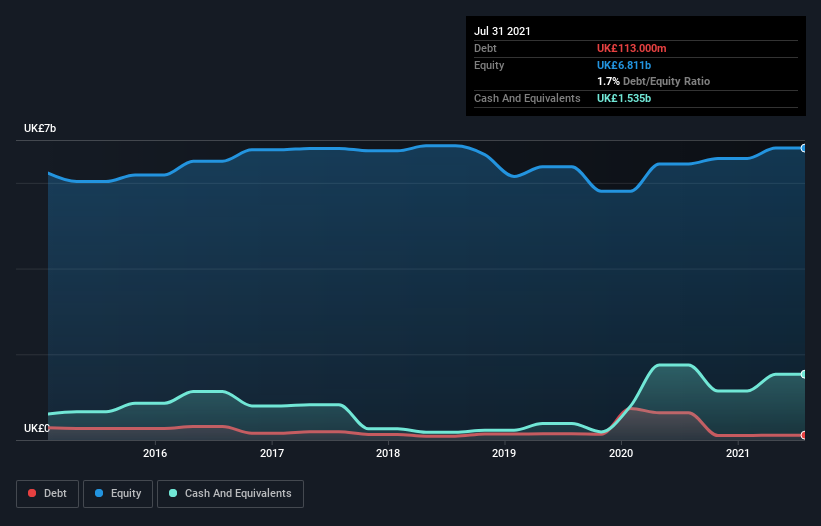
David Iben put it well when he said, 'Volatility is not a risk we care about. What we care about is avoiding the permanent loss of capital.' So it seems the smart money knows that debt - which is usually involved in bankruptcies - is a very important factor, when you assess how risky a company is. As with many other companies Kingfisher plc (LON:KGF) makes use of debt. But the more important question is: how much risk is that debt creating?
What Risk Does Debt Bring?
Debt assists a business until the business has trouble paying it off, either with new capital or with free cash flow. In the worst case scenario, a company can go bankrupt if it cannot pay its creditors. However, a more common (but still painful) scenario is that it has to raise new equity capital at a low price, thus permanently diluting shareholders. Of course, the upside of debt is that it often represents cheap capital, especially when it replaces dilution in a company with the ability to reinvest at high rates of return. The first thing to do when considering how much debt a business uses is to look at its cash and debt together.
See our latest analysis for Kingfisher
What Is Kingfisher's Debt?
You can click the graphic below for the historical numbers, but it shows that Kingfisher had UK£113.0m of debt in July 2021, down from UK£635.0m, one year before. But on the other hand it also has UK£1.54b in cash, leading to a UK£1.42b net cash position.

A Look At Kingfisher's Liabilities
The latest balance sheet data shows that Kingfisher had liabilities of UK£3.58b due within a year, and liabilities of UK£2.40b falling due after that. On the other hand, it had cash of UK£1.54b and UK£340.0m worth of receivables due within a year. So it has liabilities totalling UK£4.10b more than its cash and near-term receivables, combined.
This deficit is considerable relative to its market capitalization of UK£6.80b, so it does suggest shareholders should keep an eye on Kingfisher's use of debt. Should its lenders demand that it shore up the balance sheet, shareholders would likely face severe dilution. Despite its noteworthy liabilities, Kingfisher boasts net cash, so it's fair to say it does not have a heavy debt load!
On top of that, Kingfisher grew its EBIT by 44% over the last twelve months, and that growth will make it easier to handle its debt. The balance sheet is clearly the area to focus on when you are analysing debt. But ultimately the future profitability of the business will decide if Kingfisher can strengthen its balance sheet over time. So if you're focused on the future you can check out this free report showing analyst profit forecasts.
Finally, a business needs free cash flow to pay off debt; accounting profits just don't cut it. Kingfisher may have net cash on the balance sheet, but it is still interesting to look at how well the business converts its earnings before interest and tax (EBIT) to free cash flow, because that will influence both its need for, and its capacity to manage debt. Over the last three years, Kingfisher actually produced more free cash flow than EBIT. That sort of strong cash conversion gets us as excited as the crowd when the beat drops at a Daft Punk concert.
Summing up
Although Kingfisher's balance sheet isn't particularly strong, due to the total liabilities, it is clearly positive to see that it has net cash of UK£1.42b. The cherry on top was that in converted 113% of that EBIT to free cash flow, bringing in UK£1.0b. So is Kingfisher's debt a risk? It doesn't seem so to us. When analysing debt levels, the balance sheet is the obvious place to start. But ultimately, every company can contain risks that exist outside of the balance sheet. For instance, we've identified 2 warning signs for Kingfisher (1 doesn't sit too well with us) you should be aware of.
When all is said and done, sometimes its easier to focus on companies that don't even need debt. Readers can access a list of growth stocks with zero net debt 100% free, right now.
Valuation is complex, but we're here to simplify it.
Discover if Kingfisher might be undervalued or overvalued with our detailed analysis, featuring fair value estimates, potential risks, dividends, insider trades, and its financial condition.
Access Free AnalysisHave feedback on this article? Concerned about the content? Get in touch with us directly. Alternatively, email editorial-team (at) simplywallst.com.
This article by Simply Wall St is general in nature. We provide commentary based on historical data and analyst forecasts only using an unbiased methodology and our articles are not intended to be financial advice. It does not constitute a recommendation to buy or sell any stock, and does not take account of your objectives, or your financial situation. We aim to bring you long-term focused analysis driven by fundamental data. Note that our analysis may not factor in the latest price-sensitive company announcements or qualitative material. Simply Wall St has no position in any stocks mentioned.
About LSE:KGF
Kingfisher
Supplies home improvement products and services primarily in the United Kingdom, Ireland, France, and internationally.
Flawless balance sheet with proven track record and pays a dividend.


